
Guy Takes A Swipe At Woman’s Race, Her Revenge Is Perfectly Timed To Humiliate Him A Year Later
Nobody wants to be labeled as ignorant. It’s probably one of the worst insults out there, suggesting you have zero awareness of the world around you. While cuss words are a dime a dozen, being accused of being uneducated cuts particularly deep.
For one woman, she was shocked when a racist colleague at a house party belittled her ethnicity just because she didn’t know the name of the world’s first satellite. Humiliated, she bided her time, then used his own words against him a year later.
More info: Reddit
Racism has no place in the world, but that didn’t stop this guy from making a nasty remark about this woman’s ethnicity
Image credits: pch.vector / Freepik (not the actual photo)
The man mentioned Sputnik, but the confused woman asked him what it was
Image credits: Luiz Woellner Fotografia / Pexels (not the actual photo)
The guy belittled her for her ignorance in front of everyone at the house party and slandered her ethnicity
Image credits: krakenimages.com / Freepik (not the actual photo)
She tried to speak to him in private about it a week later, but he just insulted her again, this time accusing her of not knowing her political history
Image credits: coconut-sweet
A year later, at another house party, he was the confused one, and the woman made him eat his own words
OP begins her story by telling the community that she lives in a diverse country and works with people of many nationalities. She goes on to add that, at a house party, an Iranian colleague, L, mentioned “Sputnik”, which prompted OP to ask him what it was.
L acted with surprise that OP didn’t know and went on to loudly proclaim that Latinos are so self-centered and only learn about their own country. He then condescendingly asked her if she even knew what the Cold War was.
OP tried in vain to explain that she knew what it was, that Latino education is more Eurocentric than she’d like, and that she just didn’t know what the name of the first satellite in the space race was, but L wouldn’t hear any of it. OP tried speaking to him in private a week later, but he brushed her off with another insult, this time regarding her knowledge of political history.
OP goes on to share that, a year later, they were at another house party playing a mime game. OP’s prompt was “Russian”, so she jokingly blurted out every Russian phrase she knew. This time L was the confused one, prompting OP to basically repeat his rude outburst from the prior party to him.
She concludes that L complained that she was a bad person who held a grudge for no reason, but OP says she didn’t care because it felt so good.
L’s remarks about OP’s level of education with regards to her ethnicity were directly racist, and shouldn’t have been tolerated by anyone at the party, least of all OP. Her comeback was perfectly executed, however, and L was only unhappy because the tables were turned, and he didn’t have a leg to stand on.
Image credits: Matheus Bertelli / Pexels (not the actual photo)
In his article for The Conversation, professor of evolutionary ecology Rob Brooks writes that, over the last century, researchers studying race have found a dramatic drop in racist attitudes and stereotypes.
According to Brooks, there is strong neuroscience evidence for what we have long known – that becoming familiar with individuals from other races as well as a conscious desire to transcend our prejudices can erode racism and other forms of bigotry.
Brooks goes on to write that the brain – far from being hard-wired – is good at learning about race and triggering biases but is also capable of transcending those biases. And that’s a good thing, in evolutionary terms, because the groups we belong to shift and change over time. Our ability to change, then, is a crucial facet of our humanity.
In his article for the BBC’s Science Focus, neuroscientist Dean Burnett writes that criticisms and rejection cause brain activity that’s indistinguishable from actual pain. Put plainly, insults do hurt. Insults are complex ideas that have been studied at length, and it turns out that the impact of an insult depends as much on the recipient as it does the supplier.
There are several scientifically recognized methods to effectively diffuse insults or reverse their effects. One such method is ascribing category membership to the insulter; making the insulter seem like the lower-status, more easily ridiculed party. Others suggest finding a point that the insulter makes about themselves and amplifying it, such as belittling their lack of understanding.
According to Burnett, there are endless comebacks, but they all orbit around a central idea of not giving the insulter power, of denying them elevated status and retaining control of the exchange or narrative.
How would you have reacted if you’d been in OP’s shoes? Do you think her clap back was warranted? Let us know your opinion in the comments!
In the comments, readers applauded the woman for giving the guy a tongue lashing and agreed it was a sweet moment of revenge
Poll Question
Thanks! Check out the results:
I applaud such a Gotcha! Put AH in his place + he didn't like it. (Use your best Nelson Muntz voice: Ha Ha! )
I applaud such a Gotcha! Put AH in his place + he didn't like it. (Use your best Nelson Muntz voice: Ha Ha! )

 Dark Mode
Dark Mode 

 No fees, cancel anytime
No fees, cancel anytime 








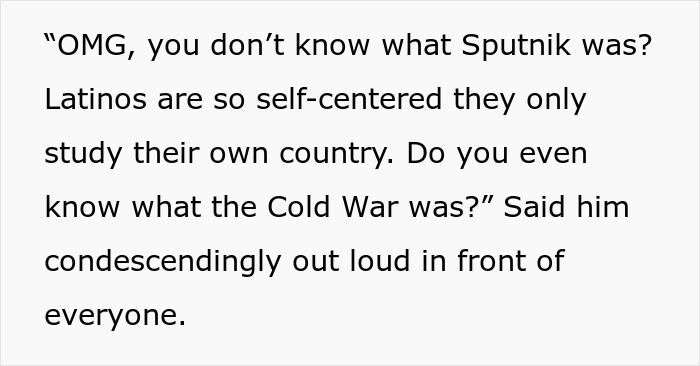
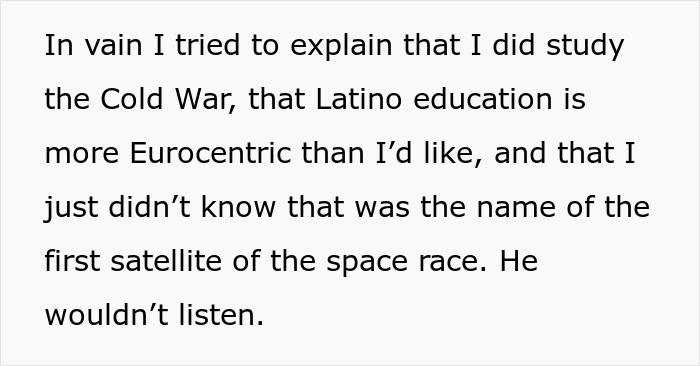

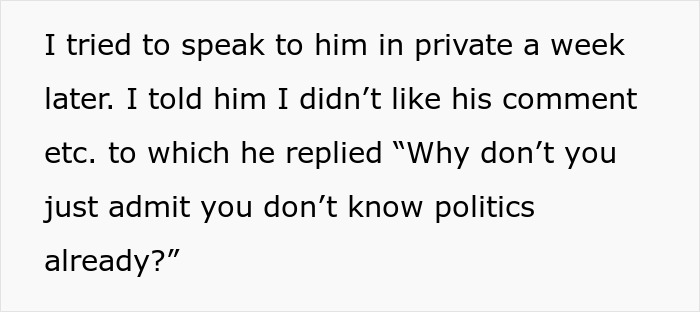
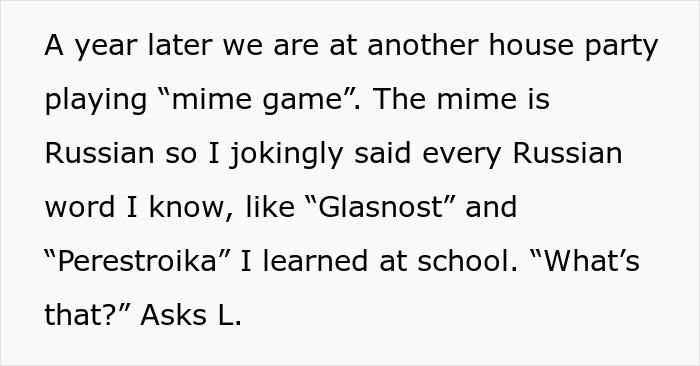

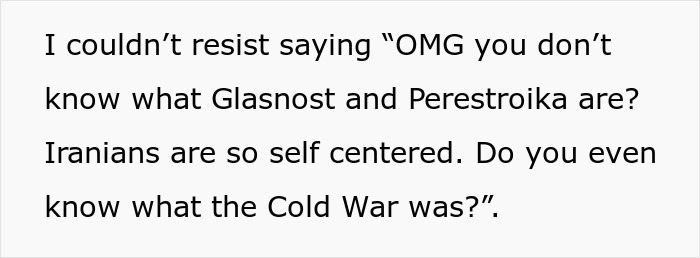




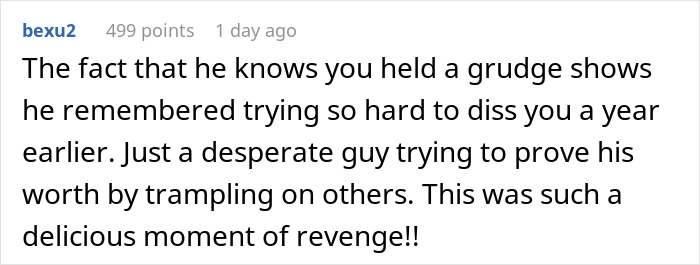
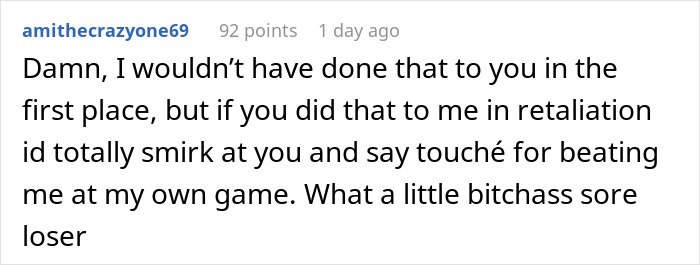






















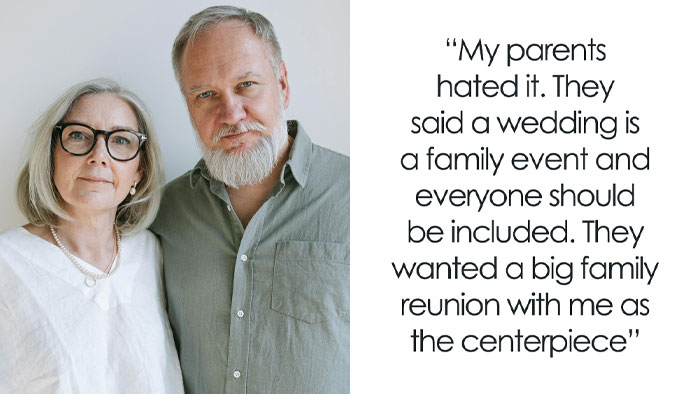






























45
24